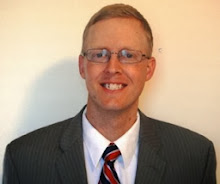I
hope the title of the post caught your attention! I'll explain it at the end of the post. My name is Dr. Matthew
Ramage, and I'm a professor of theology at Benedictine College in Atchison.
I am so pleased to have the opportunity to contribute to this blog.
Like the others who have already made their initial post, here I'm just
going to share with you my story and a little about my ministry so you can get to know the folks you'll be encountering here.
My academic and pastoral career actually began not in
theology but in the sciences. I actually began my tenure as an undergraduate
studying biochemistry and French at the University of Illinois. However, experiencing a deepening of my faith
at the campus Newman Center led me to change direction after my sophomore year.
At that time I moved to Rome to begin philosophy studies at the Pontifical
Lateran University and discern the priesthood with the Apostles of the Interior
Life, religious community with a very fruitful ministry in our own archdiocese.
My
Roman adventure came crashing to a halt when I suddenly fell seriously ill and
incapacitated one winter day. After having spent over a month in a Roman
hospital in excruciating pain but still with no diagnosis, I returned to the
States and was soon diagnosed with the chronic auto-immune disorder called
lupus. Today I still deal constantly with lupus issues–from hip necrosis to
kidney issues to a detached retina. By the grace of God, however, this does not
prevent me from doing my day to day activities more or less how I wish. But I can’t dunk basketballs and catch fly
balls.
After
sufficiently recovering from my initial acute lupus symptoms upon returning to
the States I was eventually able to complete my undergraduate degree in
Religious Studies and Philosophy at the University of Illinois. Upon graduation
I continued to discern with the Apostles of the Interior Life and worked in
campus ministry for students at Illinois State University and the University of
Kansas. During my time in Kansas I pursued further philosophy studies at
Benedictine College where I wrote a thesis on contemporary theories of natural
law. This year ended up being quite
providential when it later came to apply for a teaching job.
Over
the course of these years I discovered my vocation to married life and to the
life of a Catholic theologian. I thus
went on to earn my M.A. at Franciscan University of Steubenville and Ph.D. at
Ave Maria University, during which time my wife and I began to date, courted,
and got married. Before coming to
Benedictine College in 2009, I was blessed to teach Religious Studies at the
University of Illinois and the St. John Institute of Catholic Thought alongside
my friend and mentor, Dr. Kenneth Howell.
Today
I am blessed to teach a number of different courses at Benedictine College and
elsewhere. I help out from time to time with Benedictine College campus
ministry and serve in an advisory capacity for the college’s Institute for
Missionary Activity. I also form the Catholic
school teachers here in Atchison for the archdiocesan School of Faith and teach
the Year of Faith catechism classes here in town. This Spring I will also begin teaching classes
for the archdiocesan permanent diaconate program.
My
wife, Jen, is also a theology and language nut. We have so much fun sharing the life of being Catholic
parents and educators! She serves as an
adjunct professor in the Benedictine College Theology Department and–when she
is not off at some Bible study or book group– stays at home full-time with our
children Julia and Joseph.
If
you’ve read all the way to here, now you’ll find out why I used the word “dark”
in my post. One of my favorite
ministries is actually not usually considered a ministry at all. Rather, it’s what Benedict XVI calls “intellectual
charity,” and for me it consists in evangelizing through scholarly
writing. My most major and recent work is my book that just
came out last week. It’s called Dark Passages of the Bible: EngagingScripture with Benedict XVI and Thomas Aquinas. In a word, it asks and answers the question
you’ve probably asked yourself many times: “How can that be in the Bible?”
My hope is that through efforts like this book I will be able to make a unique contribution to the New Evangelization by engaging in some of the most difficult challenges that can be leveled at our Catholic faith, taking the bull by the horns, and offering an account of the hope that is within us, as S. Peter says in 1 Pet 3:15.



No comments:
Post a Comment
All posts and comments should be marked by Christian charity and respect for the truth. They should be on topic and presume the good will of other posters. Discussion should take place primarily from a faith perspective. No ads please.